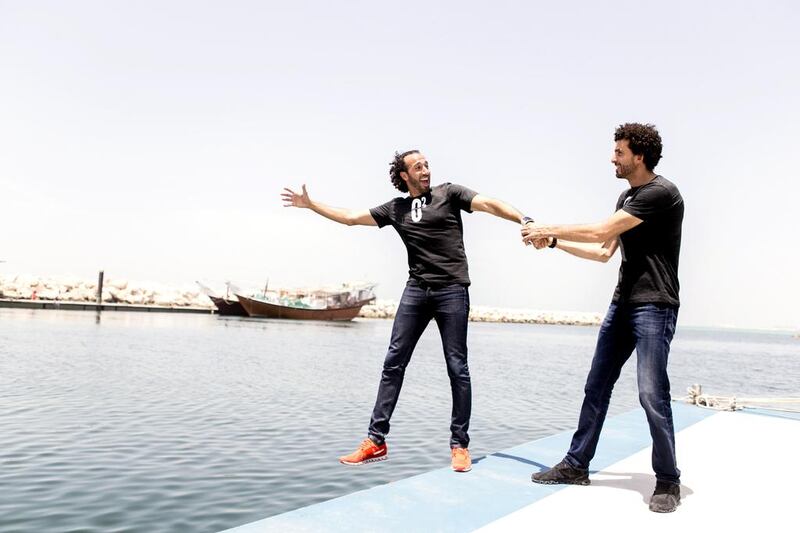DUBAI // Their characters are like fire and ice, but the two Omars taking on one of the toughest endurance challenges hope personality and mental strength will help them to row 5,000 kilometres across the Atlantic.
Egyptian adventurers and professional athletes Omar Samra and Omar Nour, or team O2, have become close friends in the short time they have known each other – and a commitment to make sporting history.
If successful, rowing unaided from San Sebastian de La Gomera in the Spanish Canary Islands to Nelson’s Dockyard English Harbour, Antigua, they will become the first Arab team to row across an ocean.
The pair will spend the next eight months training in the UAE for the gruelling task that lies ahead, starting on December 12.
“We complement each other in a lot of ways, in some areas of our personalities. There is no overlap,” said Samra, who has set up his own children’s charity and distribution company.
“I am very comfortable with him and vice versa. I know nothing about the ocean and nothing about rowing, so I wanted to throw myself into a new challenge and go as far as possible from my comfort zone.
“When I set out to climb Everest, I always wondered if I had what it took and the only way to find out was to try. This feels the same.”
While Nour is calm with a Zen-like demeanour, Samra is the polar opposite, operating at full tilt in everything he does.
Both men will need to get along, spending every second together either rowing in shifts, or cleaning and maintaining their custom-made US$100,000 (Dh367,000) vessel for about three months.
“I knew we had to be megafit but there is a different fitness requirement to complete more than 1,000 miles of nautical training,” said Nour, who took to triathlons after selling his stake in a family business in Egypt.
“We want to figure out what is best for us, maybe two hours on and off, but we will find it out over the next few months. More functional strength is needed so we’ll have to pack on a lot of muscle.”
Back injuries, inexperience and physical statures more suited to triathlon and mountaineering than the rigorous demands of rowing for 12 hours a day have not diminished the pair’s confidence of becoming the first Arabs to complete the ultra endurance task.
Both have overcome personal challenges to sit side by side in their vessel, which is just 7.5 metres long and 1.8 metres wide.
More people have been to space or climbed Mount Everest than have successfully rowed across the Atlantic, with the world record set at 40 days.
Samra is the first Egyptian to climb Everest, scale the highest mountain in each of the seven continents and ski to both the North and South Pole, despite having suffered asthma as a young man.
Adding the Atlantic crossing would complete the grand slam of adventure challenges.
“We are doing everything in our power to be in the right condition for December,” said Samra.
“Our training programmes are being tailored to our DNA so we can get the best out of our genetic capabilities.
“But it is more than just being physically ready, there are so many moving parts to consider.”
Waves as high as buildings and brushes with whales and sharks could spell disaster, and both Omars are aware they need a slice of luck to complete the event.
Nour, a professional triathlete who narrowly missed out on selection for Egypt at the Rio Olympics, once weighed more than 100 kilograms before changing his lifestyle and slimming down to just 70kg.
Both are shining examples to those who think a change towards a healthier lifestyle is beyond them, or that illness could stand in the way of achieving greatness.
“This has been done before, so we know there is a formula there to get it right,” said Nour.
“We can’t think about injuries, or what could go wrong, just focus on one stroke after the next.”
nwebster@thenational.ae







